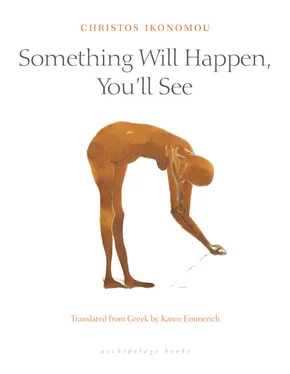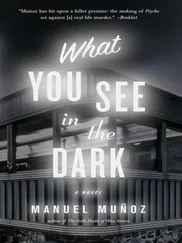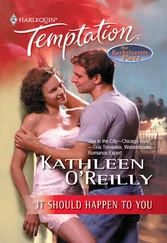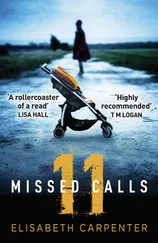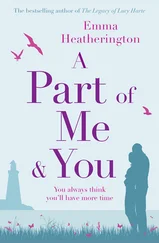In Nios where they sent me
I saw churches and windmills
and was welcomed
by a flock of fleas
The drivers on Petros Rallis Street kept slowing down to look at them. But numbers one through five didn’t care. They were very cold and knew that without a fire they wouldn’t last the night out there on the sidewalk. They didn’t care what people thought, they had other things on their minds. They were tired and sick. They were old. They had other things on their minds.
• • •
Number three tore up a box and threw the pieces into the fire. He stirred it with a thick branch then looked at the guy sitting on the stool.
You like it, huh? he asked.
What do you mean?
For other people to work while you sit there scratching your balls.
I told you guys, I’ve got a problem with my back. Didn’t you hear?
We’ve all got something. That’s why we’re out here tonight. Get up and help, you old shit.
Don’t talk to me like that, said the man on the stool. Tough guy. Who do you think you are, ordering us around?
I know how your kind is, said number three. Lazy bums who like to have a good time. I’ve met plenty of you in my day. You just cover your own ass, and everyone else can go fuck themselves for all you care.
Come on, that’s enough, broke in the man who’d arrived last, number five. He was the youngest, around sixty. He wore thick glasses and his teeth looked like a broken fence, crooked and with large gaps in between. He spoke with a lisp, too. Come on, stop, he said. We’ve got enough going on tonight, the last thing we need is a fight.
Gap-mouthed fool, number three shot back, and went to get another cardboard box.
Number two got up off his stool then sat back down and crossed his legs the other way. He lit a cigarette and blew the smoke out hard. His hands were shaking. He took his Social Security booklet out of a plastic bag and started flipping through it noisily. He muttered something to himself. Now his legs were shaking too. Then he closed the booklet and leaned over and pointed to number three who had bent down next to the dumpster and asked the others in a whisper:
Is that guy crazy?
No one spoke. They didn’t even turn to look. They kept their hands stretched out in front of them and stared at the flames wondering whether there was enough wood and cardboard for the fire, if they would manage to keep the fire going until morning.
• • •
They carried their Social Security booklets and identity cards. They carried packs of tissues and keys and coins and a few bills — some in wallets, some loose in their pockets. Each carried a bottle of water, pills and capsules for his various ailments. Number five, who’d had rheumatism for years, carried a large brown envelope of x-rays. Almost all of them carried lighters or matches and extra cigarettes to help them stay awake. Two or three carried bus passes, or tickets for the trolley or metro. Number four, who was 68 years old but had thick grey hair and a thin grey mustache, carried stones in his kidneys and a small black comb in his coat pocket. Number three carried a pair of prescription glasses that he never wore in public because he was embarrassed. Four of the five carried cell phones. Number two, who had brought his folding stool from home, carried in his wallet a photograph of his son who had died the previous month in a car accident in Halkidona. Number one, who was almost blind in his right eye, carried a booklet enumerating the miracles and visions of Saint Efraim the Martyr. He read two or three pages a day, with difficulty, to gather strength or hope or to distract himself from his troubles.
They all carried years of hard work on their backs. They carried deprivations and dreams that hadn’t come true. They carried the weight of the time they had spent with their wives and children. They carried compromises they had accepted, vows they had broken. They carried betrayals they had committed and others that had been committed against them. Deep inside each carried fear and stress and worry about illness and time, which came each day like a conscientious gardener to trim off a bit of their lives.
They were poor people, with debt to the banks and unpaid bills.
One of them owed money to a loan shark.
Two or three of them carried lottery tickets, scratch-offs and quick picks.
All of them carried secrets, hidden sins and things they rarely — or never — showed to anyone else.
Number one, who had glaucoma, carried a bracelet made from elephant hair that a woman had given him many years ago at the airport as she was leaving for South Africa.
Number two carried the dog tag his son wore around his neck while a conscript in the army.
Number three had carried a Kershaw knife ever since the night he’d seen two addicts beating an old man for his money down under the pedestrian bridge.
Number four carried a keychain with the keys to his family house on Aegina which he’d been forced to sell for practically nothing.
The one who’d arrived last, number five, carried the coin he’d found in the New Year’s pie five or six years ago. It was the only time in his life he’d gotten the coin in his slice and for a while he carried it around for good luck. At some point the pocket of his winter coat got a hole and the coin fell into the lining and he never went to the trouble of fishing it out. By now he’d forgotten it altogether.
• • •
They carried lots of old songs, images and memories from their childhood. They carried a nostalgia for the things of the past, a nostalgia that became more and more bitter with the passing of time, and instead of filling them with joy now only made them feel older and less capable.
They carried the smells of their homes. The stale smoke from the coffee houses they frequented. The dirty air of Nikaia. The scent of bitter orange trees blooming around Easter. Sometimes they felt as if they carried the whole city inside them, avenues and streets named after forgotten homelands or the honored dead and narrow alleyways where refugee houses sat hunched in the shadow of six- or seven-story apartment buildings. Sometimes they felt as if they carried city squares with broken benches, churches and graveyards and old outdoor cinemas that had been turned into supermarkets or nightclubs.
They carried so many images and voices, of the living and of the dead.
All of them, some more than others, carried a deep hatred of politicians and doctors and the civil servants who worked at the Social Security office — for anyone they could blame for the fact that they were out here tonight like bums on the sidewalk in the freezing cold far from their homes.
Two or three carried a deep hatred of themselves, for being so small and insignificant.
One carried his hatred of god who had proven himself to be even harsher and more unjust than people.
They carried the weight of their weakness, the weight of time, of the sicknesses that ate at their bodies.
Above all they carried a silent fear and a secret longing for the day that was dawning and all the days that would dawn after that.
• • •
Every so often someone brought a cardboard box or broke a pallet and threw the pieces into the fire. Drivers slowed to look at them as they passed. Some shook their heads, others honked, either in greeting or with derision. Most of the people in the cars were young, couples or groups of men probably headed home after a night out.
The one on the stool, number two, carried a bottle of tsipouro in a plastic bag from the Galaxy Supermarket. He opened it, took a swig and held it in his mouth before swallowing. The previous week he’d sworn on his son’s bones that he would never drink again. Of course he knew the oath was no good since he’d been drunk when he gave it. But now, as the tsipouro flowed through him, burning all the way down, he felt the hair on the nape of his neck rise and something cold touching his back. He shuddered.
Читать дальше
